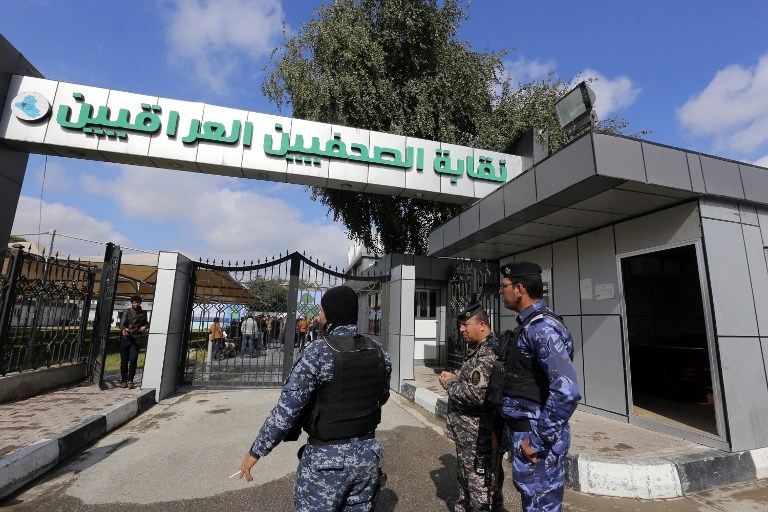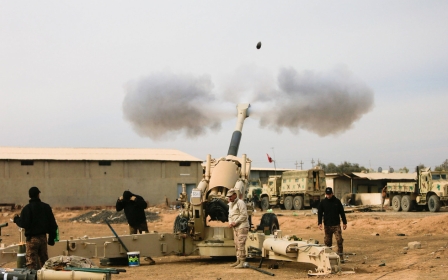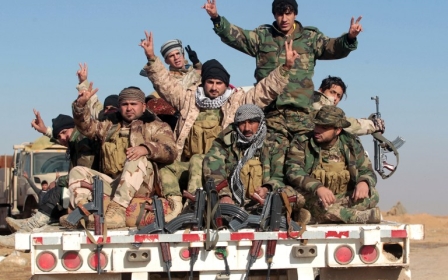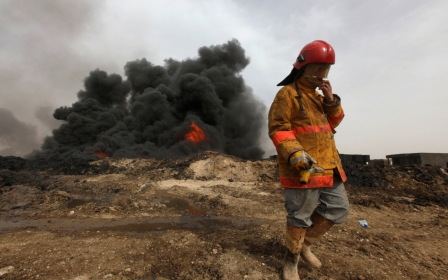Prominent Iraqi journalist kidnapped by gunmen

An Iraqi journalist was kidnapped by unidentified gunmen from her home in Baghdad overnight, police and relatives said on Tuesday, prompting Prime Minister Haider al-Abadi to order an investigation.
Afrah al-Qaisi is an outspoken critic of government institutions who had campaigned against corruption in satirical columns she writes for in several local newspapers and media outlets. Qaisi used to work for the pan-Arab, Saudi-owned newspaper Asharq al-Awsat.
Iraq's Interior Ministry said in a statement it had formed a team to look into her abduction.
The gunmen took Qaisi from the predominantly Sunni southern Saydiya district of the capital where she lived with her family, according to Ziyad al-Ajili, the head of the Iraqi Journalistic Freedoms Observatory.
"They separated the children from their mother after forcefully entering the house and took money, jewellery, laptops and her car as they left," Ajili said.
Her husband was away at the time and the assailants broke into the house after Qaisi refused to open the door.
Iraq is ranked second after Somalia in the Committee to Protect Journalists (CPJ) 2016 Index of Impunity, which calculates the number of unsolved murders over a 10-year period as a percentage of each country's population.
Over the past decade, 71 journalists have been killed with impunity in Iraq, according to the CPJ.
Many were victims of Sunni militants who were active in Iraq even before the Islamic State (IS) group overran around one third of the country more than two years ago.
But other armed factions, including Shia militias, some backed by the government, have grown increasingly powerful through their participation in Baghdad's fight against IS.
Islamic State fighters executed civilians: Rights group
In northern Iraq, 13 civilians were "summarily executed" by IS militants after villagers rose up against them at the start of the Iraqi army's offensive to retake Mosul, Human Rights Watch said on Tuesday.
The killings took place in the villages of Al-Hud and Al-Lazzagah, 50 kilometres south of Mosul on 17 October, the day government forces launched the massive operation to oust the militants from the city.
"ISIS responded to the village uprising by unlawfully executing people captured in the uprising and civilians who weren't involved," Lama Fakih, deputy Middle East director at HRW, said in a statement.
"Security forces who capture ISIS fighters should properly investigate their participation in alleged war crimes like these," she said, using an alternate acronym for the militant group.
In total, the IS militants "summarily executed at least 13 people including two boys," HRW said.
The report included the picture of one of the slain boys, a 13-year-old who had not been involved in the uprising, it said, citing his father Muhammad.
IS had captured Al-Hud and Al-Lazzagah in June 2014, with villagers saying they lived in constant fear of punishment, including death, for activities like smoking and using mobile phones, said HRW.
As Iraqi forces closed in on the morning of 17 October, about 30 villagers attacked the militants, killing 19 of them, said the New York-based watchdog.
IS militants began the execution-style killings in the afternoon, leaving bodies lying in the streets.
Iraqi forces entered Al-Lazzagah that evening and Al-Hud the next morning.
Human Rights Watch called on Iraqi security forces to "appropriately investigate incidents of alleged war crimes so that those responsible, if in government custody, can be fairly prosecuted".
After seizing control of large parts of Iraq and neighbouring Syria in mid-2014, IS declared a cross-border "caliphate," imposed its harsh interpretation of Islamic law and committed widespread atrocities.
Iraqi forces have been tightening the noose around Mosul since launching the offensive.
Middle East Eye propose une couverture et une analyse indépendantes et incomparables du Moyen-Orient, de l’Afrique du Nord et d’autres régions du monde. Pour en savoir plus sur la reprise de ce contenu et les frais qui s’appliquent, veuillez remplir ce formulaire [en anglais]. Pour en savoir plus sur MEE, cliquez ici [en anglais].




